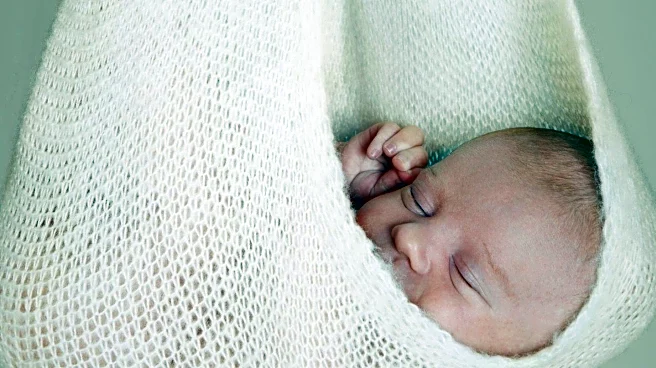What's Happening?
Consumer Reports has provided essential tips for safe infant sleep practices, coinciding with October's SIDS Awareness Month. The organization emphasizes the dangers associated with certain infant sleep products that may increase the risk of injury, suffocation, or sleep-related death. Montserrat Vargas, a mother of two, highlights her vigilance in ensuring her 3-month-old baby sleeps safely in a bassinet, avoiding pillows, toys, and blankets. Siobhan Adcock from Consumer Reports advises using non-weighted swaddles for newborns and transitioning to non-weighted wearable blankets or sleep sacks for older babies. The American Academy of Pediatrics strongly advises against bed-sharing, recommending that infants sleep in a crib or bassinet in the parents' room to reduce SIDS risk. Nursing pillows, while useful for feeding, should never be used for sleep due to associated fatalities. Consumer Reports also warns against inclined sleepers, which were banned in 2022, and highlights safety concerns with certain bassinets, such as the Halo BassiNest Flex, which may not remain flat.
Why It's Important?
The guidance from Consumer Reports is crucial for parents and caregivers aiming to minimize the risk of Sudden Infant Death Syndrome (SIDS) and other sleep-related dangers. By adhering to recommended practices, such as using flat, firm sleep surfaces and avoiding bed-sharing, parents can significantly reduce the risk of infant fatalities. The advice also underscores the importance of selecting safe sleep products, as some marketed items may pose hidden risks. This information is vital for public health, as it empowers caregivers with knowledge to make informed decisions, potentially saving lives and preventing tragedies associated with unsafe sleep environments.
What's Next?
Parents and caregivers are encouraged to review their current infant sleep setups and make necessary adjustments to align with the safety recommendations provided by Consumer Reports and the American Academy of Pediatrics. As awareness grows, there may be increased scrutiny and regulation of infant sleep products to ensure they meet safety standards. Additionally, ongoing education and advocacy efforts could lead to further reductions in SIDS cases, as more families adopt safer sleep practices. Consumer Reports may continue to test and report on infant sleep products, providing valuable insights to help consumers make informed choices.
Beyond the Headlines
The emphasis on safe infant sleep practices highlights broader issues of product safety and consumer awareness. It raises ethical questions about the marketing of potentially dangerous products and the responsibility of manufacturers to ensure safety. This development may also influence cultural practices around infant sleep, encouraging a shift towards safer, evidence-based methods. Long-term, increased awareness and adherence to safe sleep guidelines could lead to a decline in infant mortality rates, reflecting a positive shift in public health outcomes.










